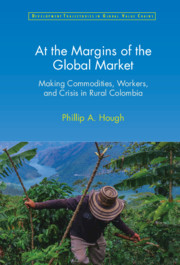Book contents
- At the Margins of the Global Market
- Development Trajectories in Global Value Chains
- At the Margins of the Global Market
- Copyright page
- Contents
- Figures and Tables
- Acknowledgments
- Introduction
- 1 Toward a Sociology of Labor and Development at the Margins of the Market
- Case Study #1 The Rise and Fall of Hegemony in the Coffee Regime of Viejo Caldas
- 2 The Rise of Fedecafé Hegemony in Viejo Caldas
- 3 Fedecafé’s Labor Regime in the Arc of US World Hegemony
- Case Study #2 Despotism and Crisis in the Banana Regime of Urabá
- Case Study #3 The Rise and Fall of FARC Counter-Hegemony in the Coca Regime of Caquetá
- Conclusion
- Appendix
- References
- Index
3 - Fedecafé’s Labor Regime in the Arc of US World Hegemony
from Case Study #1 - The Rise and Fall of Hegemony in the Coffee Regime of Viejo Caldas
Published online by Cambridge University Press: 07 January 2022
- At the Margins of the Global Market
- Development Trajectories in Global Value Chains
- At the Margins of the Global Market
- Copyright page
- Contents
- Figures and Tables
- Acknowledgments
- Introduction
- 1 Toward a Sociology of Labor and Development at the Margins of the Market
- Case Study #1 The Rise and Fall of Hegemony in the Coffee Regime of Viejo Caldas
- 2 The Rise of Fedecafé Hegemony in Viejo Caldas
- 3 Fedecafé’s Labor Regime in the Arc of US World Hegemony
- Case Study #2 Despotism and Crisis in the Banana Regime of Urabá
- Case Study #3 The Rise and Fall of FARC Counter-Hegemony in the Coca Regime of Caquetá
- Conclusion
- Appendix
- References
- Index
Summary
This chapter begins by illustrating how Fedecafé avoided the social contradictions of their fully proletarianized labor regime by engaging in collective action efforts with other coffee-exporting countries that de-peripheralized their niche in the international coffee market.While Fedecafé’s early efforts to upgrade up the coffee commodity chain fell flat, the shift in the world hegemonic context and rise of US world hegemony during the postwar decades opened opportunities for collective action efforts among coffee producer-exporter countries that became institutionalized through the International Coffee Agreements (ICA). This geopolitically regulated international coffee market system provided Fedecafé with core-like profits that were essential to the viability of their Pacto Cafetero and therefore to the establishment of a hegemonic regime in Viejo Caldas. This chapter then discusses how the world historical context shifted in the 1980s, with the United States abandoning its support for the ICA system in favor of a deregulated coffee market. It closes with a discussion of how this unraveling of US world hegemony re-peripheralized Colombia’s niche in the international coffee market. This downgrading of Colombia’s niche in the market, combined with the regime’s dependence on fully proletarianized producers, undermined Fedecafé’s hegemony and pushed the region into a series of contemporary crises of labor control.
Keywords
- Type
- Chapter
- Information
- At the Margins of the Global MarketMaking Commodities, Workers, and Crisis in Rural Colombia, pp. 88 - 124Publisher: Cambridge University PressPrint publication year: 2022

